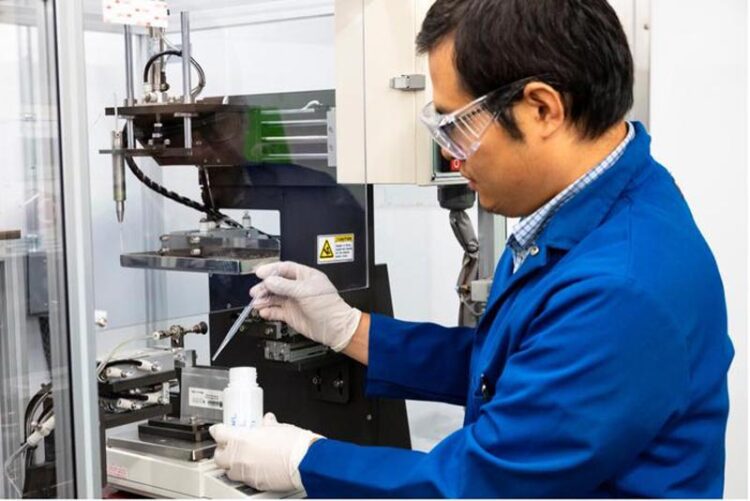Charging ahead

ORNL researcher Zhijia Du inserts a newly developed liquid electrolyte material into a battery pouch cell. The formulation extends the life of extreme-fast-charging batteries like those used in electric vehicles.
Credit: Genevieve Martin/ORNL, U.S. Dept. of Energy
New electrolyte goes extra mile for faster EV charging.
Oak Ridge National Laboratory researchers are taking fast charging for electric vehicles, or EVs, to new extremes.
A team of battery scientists recently developed a lithium-ion battery material that not only recharges 80% of its capacity in 10 minutes but keeps that ability for 1,500 charging cycles.
When a battery operates or recharges, ions move between electrodes through a medium called the electrolyte. ORNL’s Zhijia Du led a team who developed new formulations of lithium salts with carbonate solvents to form an electrolyte that maintains better ion flow over time and performs well when high current heats up the battery during extreme fast charging.
Project partners tested battery pouch cells made at ORNL’s Battery Manufacturing Facility to prove the battery’s safety and cycling characteristics.
“We found this new electrolyte formulation basically triples the Department of Energy’s target for the lifespan of an extreme-fast-charging battery,” Du said.
DOI: 10.1002/batt.202300292
Article Title: A Novel High-Performance Electrolyte for Extreme Fast Charging in Pilot Scale Lithium-Ion Pouch Cells
Article Publication Date: 13-Aug-2023
Media Contact
Heather Duncan
DOE/Oak Ridge National Laboratory
duncansh@ornl.gov
Cell: 478-718-9246
All latest news from the category: Power and Electrical Engineering
This topic covers issues related to energy generation, conversion, transportation and consumption and how the industry is addressing the challenge of energy efficiency in general.
innovations-report provides in-depth and informative reports and articles on subjects ranging from wind energy, fuel cell technology, solar energy, geothermal energy, petroleum, gas, nuclear engineering, alternative energy and energy efficiency to fusion, hydrogen and superconductor technologies.
Newest articles

NASA: Mystery of life’s handedness deepens
The mystery of why life uses molecules with specific orientations has deepened with a NASA-funded discovery that RNA — a key molecule thought to have potentially held the instructions for…

What are the effects of historic lithium mining on water quality?
Study reveals low levels of common contaminants but high levels of other elements in waters associated with an abandoned lithium mine. Lithium ore and mining waste from a historic lithium…

Quantum-inspired design boosts efficiency of heat-to-electricity conversion
Rice engineers take unconventional route to improving thermophotovoltaic systems. Researchers at Rice University have found a new way to improve a key element of thermophotovoltaic (TPV) systems, which convert heat…



